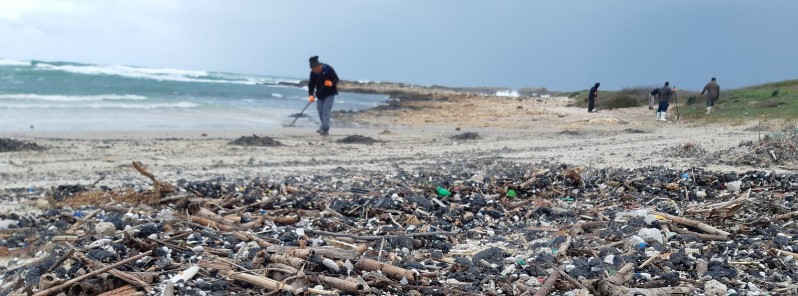Israel hit by worst environmental disaster in decades

Although the exact cause of the disaster is still under investigation, the head of the Israel Nature and Parks association said the incident is the country's worst environmental disaster in decades. The cleanup of over 170 km (106 miles) of affected coastline will take a long time and consequences will be felt for years.
Dozens of tons of fresh tar lumps began landing on Israeli beaches in Habonim, Maagan Michael, and Neve Yam on Wednesday, February 17, 2021.
On Sunday, February 21, Israel's Ministry of Environmental Protection (MoEP) warned people to refrain from going to beaches from Rosh Hanikra, in the north, down to Zikim Beach in the Hof Ashkelon Coastal Council, until further notice.
"Do not go to Mediterranean Sea beaches for swimming, sports, or recreational activities until further notice," the ministry said Sunday.
"Exposure to tar can be harmful to public health! The Ministries are continuing to monitor the situation and will update the public regarding this matter."
It's still unclear what the source of the tar is, landing on the beaches since Wednesday morning, authorities said.
Tar is a product of the decomposition and crystallization of oils and oil products. This is usually the result of the illegal dumping of oil into the sea from a passing ship.
"The source is not known, but it should be noted that if it's from the dumping of oil from a ship, it may have traveled a great distance," MoEP said.
Because the tar that has been landing on the coasts is either semi-solid or completely solid, it must be removed manually, with the oily and sand debris being separated from regular debris as much as possible, the ministry said.
"The disaster we are witnessing in recent days on the beaches of Israel is the most serious ecological disaster in recent years, and we'll see its consequences in years ahead," the country's Nature and Parks association said.
The nature reserves affected are Shakmona, Habonim, Rosh Hanikra, Tel Dor, Palmachim, Nitzanim, Zik Gedor, and Hasharon Beach.
Featured image credit: Yossi Ozem, Nature And Parks Authority

Karma